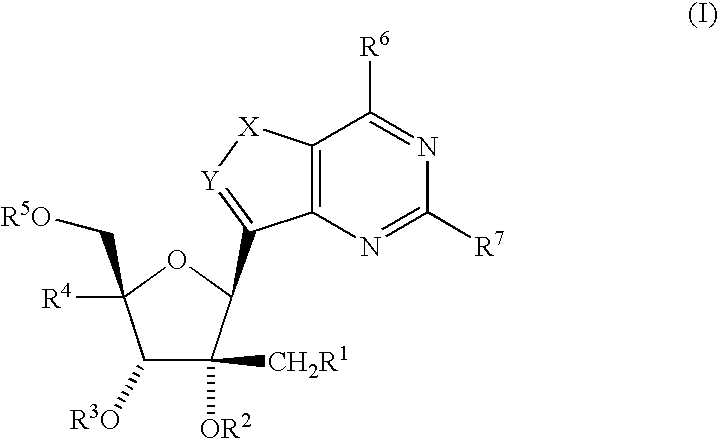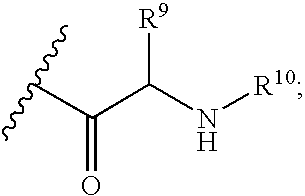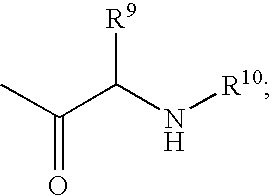C-Purine Nucleoside Analogs As Inhibitors Of Rna-Dependent Rna Viral Polymerase
- Summary
- Abstract
- Description
- Claims
- Application Information
AI Technical Summary
Benefits of technology
Problems solved by technology
Method used
Image
Examples
example 1
[0140]
7-Amino-3-(2-C-methyl-β-D-ribofuranosyl)-1H-pyrazolo[4,3-d]pyrimidine
[0141] Step A:
[0142] To a solution of 2-C-methyl-3,5-di-O-(4-methylbenzoyl)-D-ribofuranose [prepared following procedures described in M. Bio et al. in “Practical Synthesis of a Potent Hepatitis Virus C Polymerase Inhibitor,”J. Org. Chem., 69: 6257-6266 (2004)] (24.00 g, 60.00 mmol), 4-dimethylaminopyridine (1.46 g, 12.00 mmol) and triethylamine (55.00 mL, 396 mmol) in 1,2-dimethoxyethane (250 mL) at 0° C. was added p-toluoyl chloride (17.50 mL, 132.00 mmol) dropwise over a period of approximately 30 min. The cooling bath was removed, and stirring at room temperature was continued for 18 h. The reaction mixture was poured onto ice (400 g) and stirred until all the ice had melted. The solid was filtered off, the cake was washed with water (3×100 mL) and methyl t-butyl ether (MTBE) (2×100 mL). The white solid was then dried under vacuum until no more loss of weight was observed. LCMS: for C38H36O9 calculated...
example 2
[0162]
7-amino-3-(2-C-methyl-β-D-ribofuranosyl)-isoxazolo[4,5-d]pyrimidine
[0163] Step A:
[0164] A suspension of sodium hydride (2.38 g, 59.61 mmol, 60% dispersion in oil) in anhydrous 1,2-dimethoxyethane (10 mL) was cooled in an ice bath and treated dropwise with a solution of diethyl cyanomethylphosphonate (11.73 g, 66.25 mL) in anhydrous 1,2-dimethoxyethane (10 mL) during a period of 30 min. Stirring in the cold was continued for another 30 min. To the reaction mixture, a solution of 2-C-methyl-3,5-di-O-(4-methylbenzoyl)-D-ribofuranose (6.63 g, 16.56 mmol) in dry 1,2-dimethoxyethane (20 mL) was added dropwise over 45 min. At the end of the addition the cooling bath was removed, and the reaction mixture was stirred for an additional 2 h. The reaction was quenched by pouring onto 100 mL of water, and the crude product was extracted with MTBE (3×100 mL). The combined ethereal extracts were backwashed with brine, evaporated to dryness, and the crude material (13.7 g) was purified by ...
example 3
[0175]
4-Amino-7-(2-C-methyl-β-D-ribofuranosyl)-furo[3,2-d]pyrimidine
[0176] Step A:
[0177] A solution of the nitrile from Step F of Example 4 (minor isomer, 232 mg, 0.5 mmol) in THF (3 mL) was added to a −78° C. cold solution of LDA (generated from 142 μL of diisopropylamine, and 400 μL of n-BuLi (2.5 M in hexanes)) in THF (3 mL), and stirring at cold was continued for 30 min. Neat methyl formate (60 μL, 1 mmol) was then added via syringe and stirring at −78° C. was continued for another 1 h. The cooling bath was removed, and the temperature of the reaction mixture was allowed to come into equilibrium with an ice-water bath, and this temperature was maintained for 15 min. The reaction was quenched with an aqueous solution of citric acid (10 mL, 10%) and the product was extracted with chloroform (3×30 mL). The combined extracts were washed with brine (1×20 mL), dried (sodium sulfate) and the solvent was removed in vacuo. The crude product was used in the subsequent step without any ...
PUM
 Login to View More
Login to View More Abstract
Description
Claims
Application Information
 Login to View More
Login to View More - R&D
- Intellectual Property
- Life Sciences
- Materials
- Tech Scout
- Unparalleled Data Quality
- Higher Quality Content
- 60% Fewer Hallucinations
Browse by: Latest US Patents, China's latest patents, Technical Efficacy Thesaurus, Application Domain, Technology Topic, Popular Technical Reports.
© 2025 PatSnap. All rights reserved.Legal|Privacy policy|Modern Slavery Act Transparency Statement|Sitemap|About US| Contact US: help@patsnap.com



